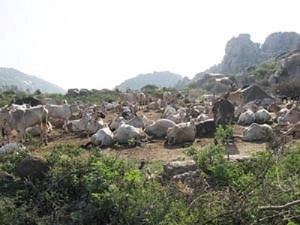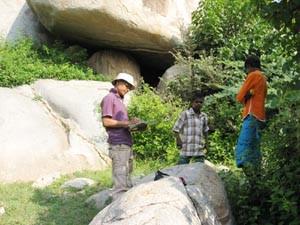Usham Singh
Other projects
The study aims to conduct education awareness programme in the localities that experienced leopard-human conflict in Central Karnataka, India. A joint-venture programme is planned by inviting parties of forest department officials and village heads. It primarily aims to bridge the gap between foresters and locals. Developing relations between forest officials and locals is crucial in reducing the conflict. The best conflict prevention technique employed by locals will be adapted for wider application.

Cattles in the scrub forest, Koppal, Karnataka.
Study carried out during Rufford First Grant, 2008-09 was successful in identifying areas with leopard-human conflict in Central Karnataka, India. Project team plans to reach those settlements and organise educational programmes. Interactive sessions will be held on various topics namely reasons of conflict and finding solutions to deal with the problem. State sponsored scheme like compensation and procedure to avail the funds during loss of livestock will be informed to the locals.

Project leader investigating the spot of livestock predation by leopard.
The study plans to identify local leaders who are committed to conservation. They will be invited in the joint-venture programme which will be held in presence of the managers. Strategies and policies to mitigate conflict will be drafted for implementation. Project team will carry out research on various traditional techniques which locals used to prevent leopards attack on human and predation on livestock. It aimed to identify the best technique and locals will be advised to adopt the technique at the village level. Education awareness is one of the best tools for conservation. It gives opportunity to the locals to take part in conserving animals. Participation of the locals and managers is one of the best strategies in solving leopard-human conflict.